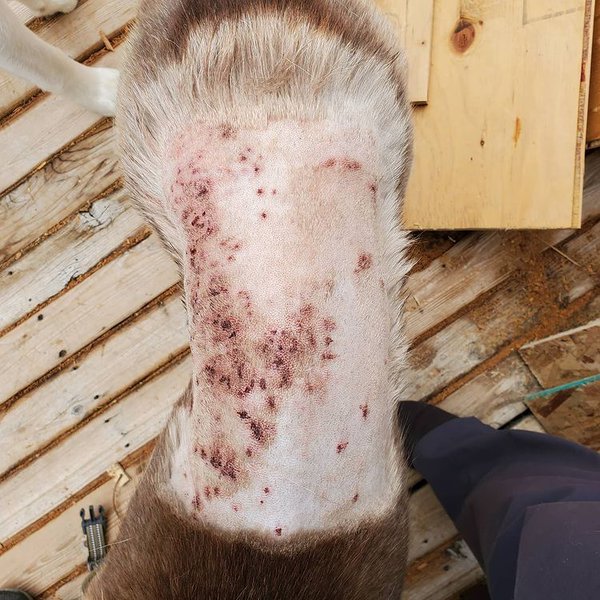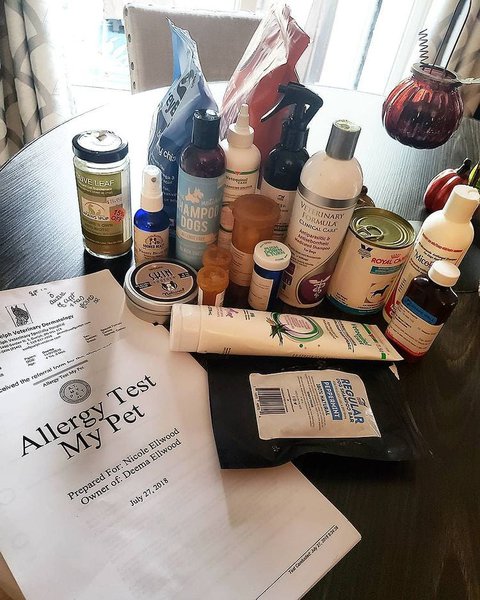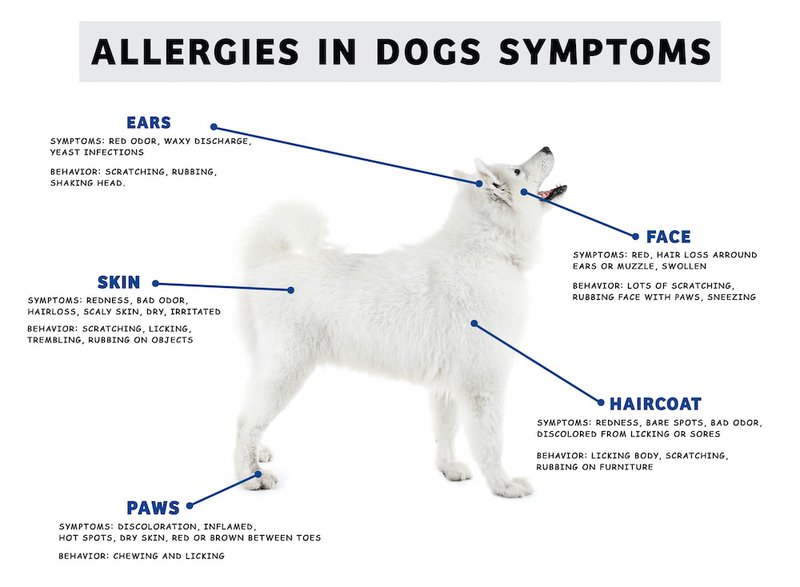Dog allergy is an adverse immunological reaction to a particular protein found in dog dander, saliva, or urine. Common signs of an allergic reaction include sneezing, runny nose, itchy and watery eyes, and coughing. In more severe cases, hives, difficulty breathing, and anaphylaxis may occur.
The main causes of dog allergies are food allergies, environmental allergies, flea allergies, and medication allergies.
Causes Of Dog Allergies

Dog allergies are triggered by allergens that are inhaled, ingested, or come into contact with a dog’s skin.
The dog’s immune system perceives these materials as invaders and sends out inflammatory substances to fight off the invader.
Here are the 4 most problematic allergens to take note of.
#1: Fleas Allergies
Many dogs are allergic to flea saliva, which can cause redness and irritation on their skin. In severe cases, they may even develop an infection due to constant scratching of the affected area.
#2: Food Allergies
Just like people, dogs can be allergic to certain foods. Common allergens include beef, chicken, wheat, soy, and corn. If your dog is allergic to a particular food, it may experience vomiting, diarrhea, or skin irritation after eating it.
#3: Environmental Allergies
Dogs can also be allergic to pollen, dust mites, and mold spores. These allergies can cause runny eyes and nose, as well as itchy skin.
These tend to spike during spring and other blooming seasons and you will usually notice the signs after the dog spends time outdoors. The pollen causes reactions on the skin that was in contact with the ground, paws, nose, and around their mouths causing inflammation that is marked by red, swollen, and irritated surfaces.
#4: Medication Allergies
Some dogs are also allergic to certain medications. If your dog is taking antibiotics or other types of medicine and starts having a reaction (such as vomiting or diarrhea), contact your veterinarian right away so that you can find an alternative treatment option.
How Can You Tell If A Dog Has Allergies? Common Symptoms Of Dog Allergies

Dog allergies are more common than many dog owners realize. The reason they go unnoticed so much is how subtle and general a lot of the symptoms can be. However, if you are vigilant and know what to look for you will definitely notice them. To help you out, here are some of the most common signs and symptoms of dog allergies.
Itchiness and hives
It is normal for a dog to itch occasionally but if it becomes too much in terms of frequency and intensity then you may have something to worry about.
Vomiting and diarrhea
This is most commonly seen with food allergies and intolerance. What sets it apart from other causes of the same symptoms is that these usually, but not exclusively, happen soon after eating.
Coughing and sneezing
Some dog allergies affect the respiratory directly and in such cases the allergens trigger coughing and sneezing fits.
Swelling around the face
If your dog has episodes where their faces and ears just get swollen locally or generally puffy then you may be dealing with an allergy. This happens whether the allergy is on the skin, respiratory, or digestive.
Teary eyes and runny nose
These happen a lot with allergic dermatitis and respiratory allergic reactions. You will notice redness on the eyes or around the nose and increased moisture on the surfaces that may be as bad as a constantly runny nose or teary eyes.
Long term ear infections
This is a commonly missed sign of allergic reactions that is common with parasites like mites and fleas but may also occur with pollen particles that make their way into the dog’s ear.
Can Allergies Kill A Dog?

The answer here is yes. However, this is a tentative response as cases of fatality in dogs from allergic reactions are actually very rare. However, it is a serious enough consequence that should not be ignored as a possibility.
So how can something as simple as pollen or as little as a flea kill your big and otherwise healthy dog?
Anaphylactic shock
One way deaths happen from allergic reactions in dogs is through anaphylactic shock. To put it simply, this is when the immune system really goes ham on simple allergens and ends up causing a lot more harm than good. The reactions start out like simple allergies and as the immune cells and chemicals involved continue to build up in the dog’s body, things get out of hand.
This extreme reaction can be triggered by an allergen and the eventual death usually happens as a result of inflammation and subsequent blockage of the airway.
Dehydration
Another potential cause of death from allergies would be excess dehydration and loss of electrolytes as a result of vomiting and diarrhea from food allergies. This happens mainly with young puppies as they are weaker and need more support to recover. However, with adults, it would just cause discomfort and weakness and is easier to manage.
Indirect Means
In addition to the direct cause, allergies could kill a dog through indirect means. The most common here are infections resulting from allergic dermatitis. As the dog continues to scratch, they eventually develop open wounds which can very easily get infected. A commonly implicated culprit here is the staphylococcus group of bacteria. They move quickly from causing local infections to systemic sepsis with potentially fatal consequences.
How Can I Treat My Dogs Allergies At Home?

Dog allergies are more often than not pretty easy to manage once identified. You may not even have to put them on medication. Let’s take a quick look at some of the most effective natural remedies for dog allergies using products you can easily find at home.
Discontinue the problematic food
Food allergies are very common and also super easy to manage. Just stop feeding the dog whatever it is that is causing them trouble. If it is a dog food preparation, consider switching to a new brand with different ingredients. If it is homemade food, switch out ingredients one at a time starting with the proteins, and monitor for results.
Try organic food
Sometimes, it is not the main ingredients that cause the problem with food allergies instead it is the additives. That is why organic and all-natural dog food options are such a fantastic alternative if you are dealing with these problems.
Apple cider baths
Apple cider works wonders when it comes to getting rid of many allergens that cause dog issues. This includes bugs like mites and fleas which cannot stand the smell of the stuff. It also helps dissolve and get rid of any pollen hanging on to the fur and causing reactions.
Essential oil treatments
The most effective here include olive oil, lavender oil, chamomile extracts, and neem oil. In addition to soothing the irritated skin and calming down the agitated pooch, essential oils help to ward off fleas, mites, and ticks.
Oat treatments
One of the most effective ways to soothe a dog’s irritated skin is through oat treatments. It could be a bath with oat powder added, oat pastes and masks, or even oat-based dog shampoos. These help to soothe skin after allergic dermatitis preventing major complications.
What Is The Best Allergy Medicine For Dogs?

In addition to the natural remedies, there are several medical routes you could take as a dog owner to deal with allergies in your dog. This is particularly useful with nasty reactions where the dog needs as much help as it can possibly get.
In this case, it is best to consult a vet to prescribe the best medicine for your dog’s allergies. That way, you will know not only what is effective but also what is safe for your best buddy. Here are some of the best anti-itch medicines for dogs that your vet may suggest.
Antihistamines
Allergic reactions include the production of a compound known as histamine in the bloodstream. This is responsible for most of the symptoms including itching, inflammation, runny nose and so much more.
Antihistamines counter the effects of the compound while also reducing its production. This makes them effective and fantastic for fast relief. Some of the best out there include Benadryl, Cetirizine, and Loratadine
Corticosteroids
Corticosteroids have an immunosuppressant effect. This means that they are fantastic when it comes to keeping the immune system from overreacting. Given their mode of action, these drugs are more often than not prescribed for prevention and not relief after the fact and are ideal for chronic allergies.
Plant-based medication
There are many plants out there with antihistamine-like effects. A wonderful example of a product that takes advantage of this is Vet’s Best Seasonal Allergy Relief. It contains powerful ingredients like nettle, kelp, quercetin, vitamins C and E which in addition to minimizing the effects of allergic reactions strengthen and stabilize the immune system.
Related Questions
How Long Do Pet Allergy Symptoms Last?? An episode of a dog allergic attack typically lasts between 6 hours to 3 days. This is, of course, assuming that the trigger is removed in one way or another. However, the symptoms can last up to 10 days depending on the type of allergy, the level of exposure and the dog’s immune system.
Can I Give My Dog Benadryl For Allergies? Yes, you can give your dog Benadryl. It is a highly effective antihistamine that offers quick relief with acute and chronic reactions. For safety, it is best to get a prescription and dose recommendations from a practicing vet so that you also know side effects that you may need to prepare for.
What Are Dog Seasonal Allergies? These are allergies that appear during some seasons and disappear in others. They are caused by allergens whose appearance is also seasonal. In this case, pollen is the most common cause of seasonal reactions and causes both skin and respiratory reactions in the dog after exposure from both airborne and ground pollen.





